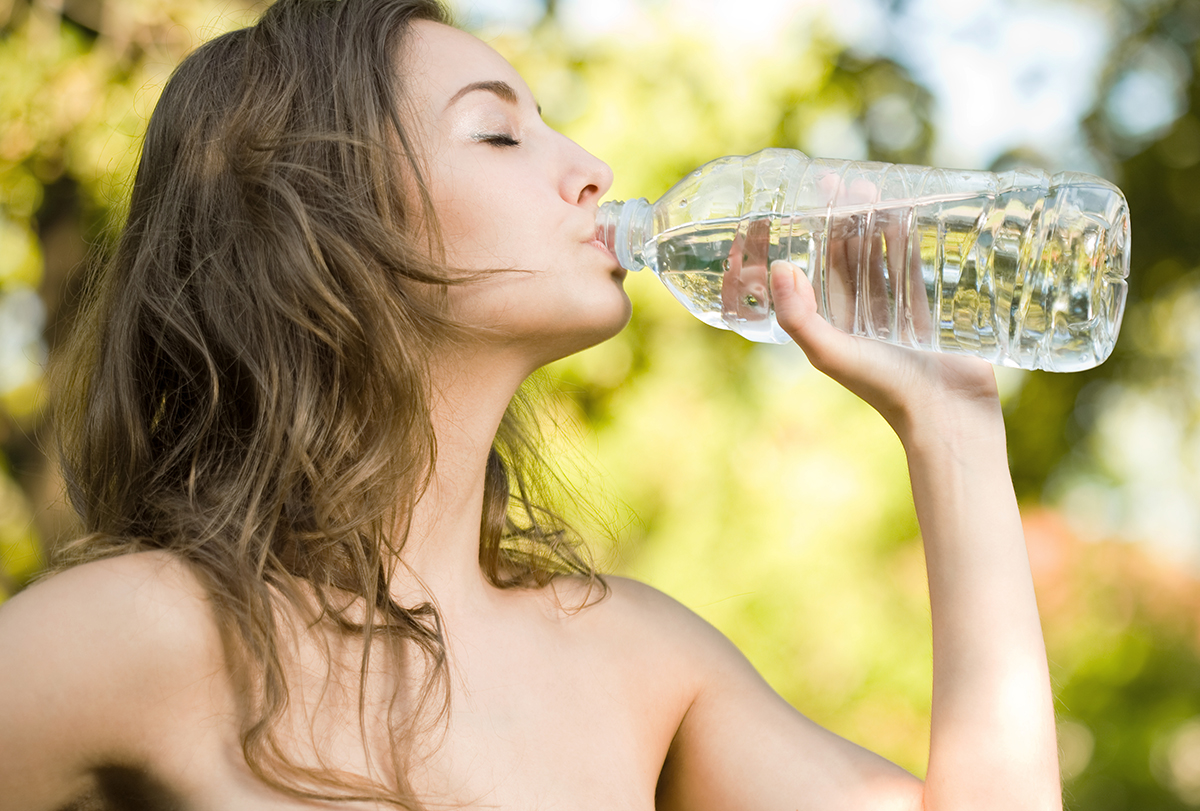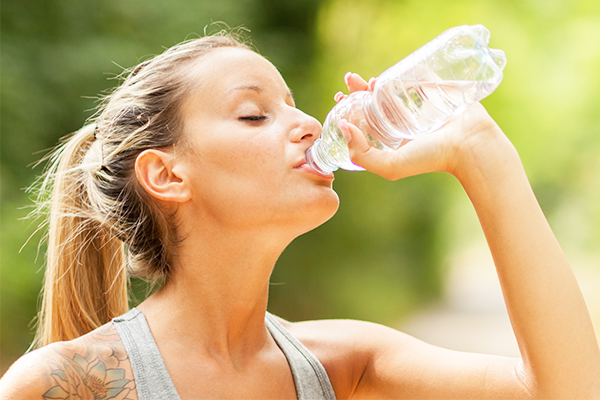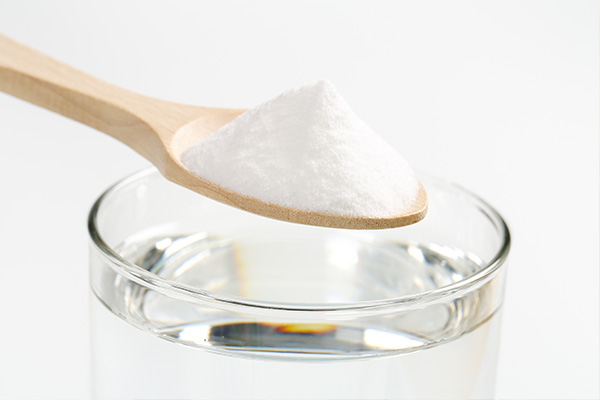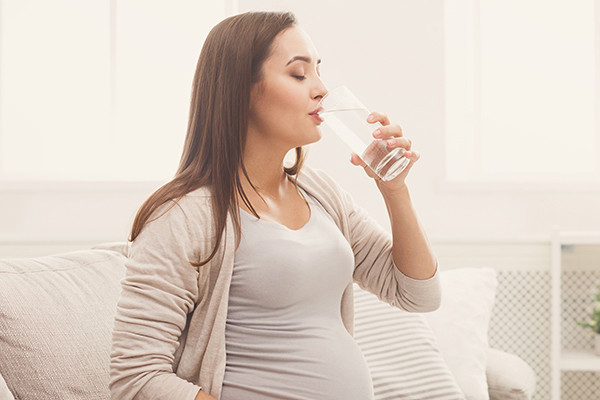In this article:
Excessive loss of water from the tissues in the body is called dehydration. An individual gets dehydrated when body fluids are secreted out and not replenished, primarily due to a lack of water intake.

The reduced water content of the body creates an imbalance of minerals, such as potassium, sodium, and chloride, as well as sugar and electrolytes. This state can harm the normal metabolic functioning of the body.
Optimum Fluid Levels
Your body should be well hydrated to function at its best, or else you will be riddled with lethargy, irritability, sleep problems, and generalized malaise that can hamper your productivity and well-being.
The sixth report in the series of Dietary Reference Intakes (consensus reports that provide reference values for the required nutritional intake by Canadians and Americans) published by the Food and Nutrition Board suggests amounts of total water intake for both genders.
It recommends that women consume approximately 2.7 liters or 91 ounces of total water every day, including all foods and beverages. For men, the suggested amount is 3.7 liters or 125 ounces of total water daily.
Roughly 80% of the total water intake of an individual is met with water and beverages, including caffeinated drinks, while the other 20% is provided by food. (1)
Causes of Dehydration

Dehydration can result from various reasons that include:
- Excessive sweating due to hot weather, sauna, or exercise
- Fever
- Diarrhea
- Vomiting
- Some chronic disorders
- Active bleeding
- Frequent urination (due to diabetes or use of medicines such as diuretics)
- Excessive alcohol intake (alcohol acts as a diuretic)
- Excessive caffeine intake (caffeine is a diuretic)
- Lack of water intake due to not feeling thirsty or sicknesses such as nausea or sore throat
- Cold weather does not let you feel thirsty often, leading to decreased water intake.
- Hot weather increases perspiration rates.
- People living at higher altitudes require higher water intake.
Signs of Dehydration
The onset of dehydration can be recognized by the following symptoms:
- Thirst
- Skin dryness
- Fatigue
- Light-headedness
- Headache
- Reduced urination or dark-colored urine (dark-colored urine may also be due to other reasons)
- Eye twitching
- Weakness
- Muscle cramps
- Chills
The following symptoms are associated with severe dehydration:
- Confusion
- Fainting
- Dry mouth/eyes
- Dizziness, vertigo
- Heart palpitations
- Rapid pulse
- Low blood pressure
- Rapid breathing
Dehydration in babies produces symptoms such as:
- Sunken soft spot on the head (fontanelle)
- Lack of tears
- Lack of urination
- Drowsiness
Side Effects of Dehydration

If dehydration is persistent and not treated promptly, you can develop severe health complications that include:
- Heatstroke or heat exhaustion (A dehydrated body cannot produce sweat for cooling down; as a result, the body temperature becomes extremely high.)
- Seizures which can be triggered by severe dehydration
- Urinary and kidney disorders including kidney failure
- Low blood volume, shock, and heart failure
- Brain damage
- Death (Although extremely rare, severe dehydration can be fatal due to failure in blood circulation.)
Treatment for Dehydration

Mild dehydration can be treated by increasing water intake. For mild dehydration, solutions that contain salt are recommended.
For moderate and severe cases, replenishment of electrolytes, including potassium and sodium, is necessary. The use of oral rehydration solutions (ORS) available over the counter is beneficial as they contain defined levels of electrolytes needed by the body.
ORS is chiefly used for the treatment of mild dehydration in children that results from diarrhea or vomiting. Severe cases of dehydration require medical care. Intravenous (IV) solutions that contain sodium chloride are given. The IV solutions are administered at a fast pace initially, and the rate is then lowered with improvement in hydration status.
Some patients may require treatment that is specific to the cause of the dehydration. For example, the doctor may prescribe medications to treat diarrhea or vomiting if it is the underlying cause of the dehydration.
Diagnosing Dehydration
Diagnosing dehydration can be made with the help of a few routine tests that may include the following:
- Checking the vital signs such as the pulse, blood pressure, and temperature
- Urine test to determine the dehydration level
- Blood tests to assess the electrolyte levels, kidney function, and extent of dehydration
Risk Factors for Dehydration
Various factors can predispose you to dehydration, which includes:
- Old age, young age
- Kidney problems
- Low body weight
- Hospitalization
- Extremely hot environment
- Use of multiple medications, especially diuretics
- Acute illness with associated fever, vomiting, or diarrhea
- Depression
- Anorexia
- Diabetes
- Vigorous exercise and climbing to high elevations
- Extensive burns (including sunburns)
When to See a Doctor
It is recommended to seek medical attention if you are dehydrated and experience any of the following symptoms:
- Sunken eyes
- Extreme thirst
- Dry mouth and dry eyes
- Lack of sweat
- Fever
- Unconsciousness
- Confusion
- Dizziness
- Dry skin
- Red and hot skin
- Rapid breathing
- Fatigue
- Bloody or black stool
- Persistent vomiting over several hours
- Diarrhea for more than a day that is frequent and not improving
- Inability to retain fluids
- Wrinkled skin with other symptoms stated above (It is important to keep in mind that even without dehydration, skin wrinkles are not always known to respond to increased fluid intake.)
While mild dehydration can be treated without medications, it is important to consult your doctor if you are severely dehydrated. Timely treatment of dehydration can help in the prevention of complications.
Expert Answers (Q&A)
Answered by Dr. Amber Robins, MD (Family Doctor)

For most women, dehydration during pregnancy could lead to uterine contractions at various stages of pregnancy.
The concern for anyone, whether pregnant or not, would be that severe dehydration can lead to low blood pressure and less blood reaching the vital organs. Optimum blood pressure and good blood circulation are needed for the body to work properly.
To avoid the unpleasant effects of dehydration, pregnant women should ensure to drink enough water, especially during warm weather.
Milk can be used for rehydration, although water or a drink with electrolytes is even better.
For those with diarrhea or vomiting, drinking something with electrolytes is preferred to replace those that were lost. Milk can help increase calcium levels but is not the go-to for rehydration.
The body has a way to compensate for minor dehydration, which does not severely affect organs.
However, with very severe dehydration that is caused by low fluid intake or excessive bleeding, the body can go into shock, which can affect the brain, liver, kidneys, and heart.
The pinching test usually detects severe dehydration but it is not common for people to reach this point.
A sign that you are dehydrated in the earlier stages is concentrated urine. The more yellow your urine is, the more dehydrated you likely are.
Coffee can cause dehydration as it is a diuretic, which increases urine production. Frequent urination leads to fluid loss from the body. To balance out the effects of coffee, drink more water to replenish the lost fluids.
The simplest test to know whether you are hydrated is by looking at your urine. If your urine is clear, it is more likely that you are hydrated.
To avoid dehydration, it is good to plan specific times during the day to rehydrate. If you know that you will be in a warm climate, you should carry water with you to hydrate throughout the day.
Final Word
An imbalance between the loss of water from the body and fluid intake results in dehydration. This condition may reduce the amount of minerals, sugars, and salts in the blood and may cause metabolic problems.
Severe dehydration can lead to a decline in blood volume and cause serious harm to your vital organs.

- Was this article helpful?
- YES, THANKS!NOT REALLY



